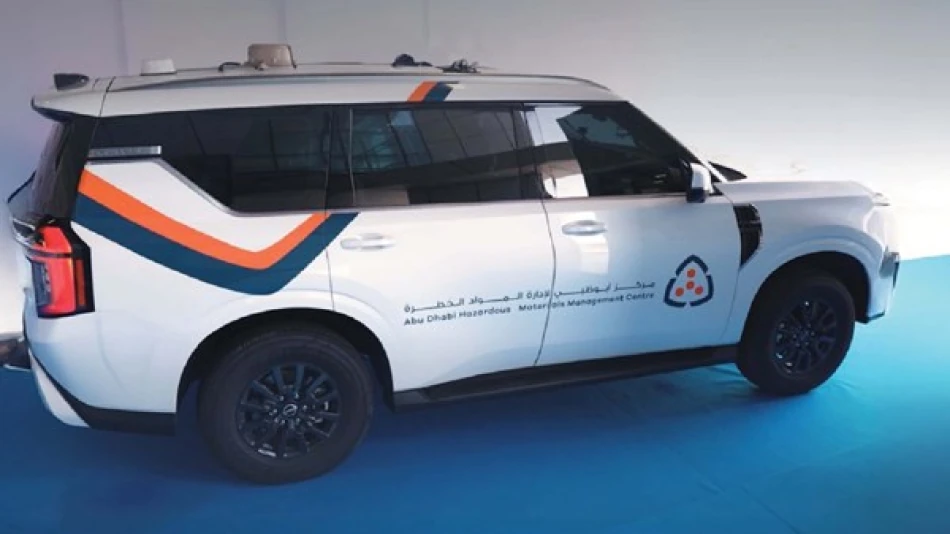
Abu Dhabi Hazardous Materials Authority Launches 'Raqib' Patrol to Enhance Safety and Security
Abu Dhabi Deploys High-Tech "Raqeeb" Patrol Unit to Transform Hazardous Materials Oversight
Abu Dhabi has launched an advanced mobile inspection unit equipped with artificial intelligence and real-time monitoring capabilities to revolutionize how the emirate manages hazardous materials. The "Raqeeb" patrol represents a significant leap toward automated regulatory compliance, positioning Abu Dhabi as a regional leader in industrial safety technology while addressing growing concerns over chemical and industrial waste management in rapidly expanding urban centers.
Smart Technology Meets Industrial Safety
The Abu Dhabi Center for Hazardous Materials Management unveiled the Raqeeb patrol unit as part of a comprehensive strategy to enhance field surveillance and inspection of hazardous material handling across the emirate. The mobile unit integrates the sophisticated "Adham" inspection system, an AI-powered platform designed to streamline inspection procedures and dramatically improve operational efficiency.
Unlike traditional inspection methods that rely heavily on manual processes and periodic site visits, the Raqeeb system operates on continuous data collection and real-time field analysis. This approach enables authorities to identify potential violations before they escalate into environmental or safety incidents, marking a shift from reactive to predictive regulatory enforcement.
Advanced Detection Capabilities
The patrol unit comes equipped with state-of-the-art detection equipment capable of identifying gaseous, liquid, and solid hazardous materials. Environmental monitoring tools measure emissions and track key indicators that could signal regulatory breaches or safety concerns. High-definition cameras document inspection processes, creating a transparent audit trail that supports evidence-based decision-making.
Personal protective equipment ensures inspection teams can safely operate in potentially dangerous environments, while the integrated data analysis system provides immediate feedback to relevant authorities when intervention is required.
Regional Leadership in Industrial Oversight
Abu Dhabi's deployment of the Raqeeb system reflects broader regional competition to establish world-class regulatory frameworks that attract international investment while maintaining strict safety standards. The UAE has consistently positioned itself as a hub for industrial and logistics operations, requiring sophisticated oversight mechanisms to manage the associated risks.
This initiative aligns with similar technological advances in Singapore and parts of the European Union, where regulatory authorities increasingly rely on automated monitoring systems to manage complex industrial ecosystems. However, Abu Dhabi's integrated approach—combining mobile units, AI analysis, and real-time reporting—represents one of the most comprehensive deployments of such technology in the Middle East.
Economic and Investment Implications
For businesses operating in Abu Dhabi's industrial sectors, the Raqeeb system signals both opportunity and challenge. Companies demonstrating consistent compliance may benefit from streamlined regulatory processes and enhanced reputation with international partners. However, organizations with substandard safety practices face increased scrutiny and potential penalties as the AI-powered system identifies violations more efficiently than traditional methods.
The transparent, data-driven approach could attract multinational corporations seeking jurisdictions with predictable regulatory environments and robust safety standards. This technological edge may prove particularly valuable as global supply chains increasingly prioritize environmental, social, and governance (ESG) criteria in location decisions.
Strategic Vision for Sustainable Development
Major General Ahmed Saif bin Zaitoon Al Muhairi, Commander-in-Chief of Abu Dhabi Police, emphasized that the initiative supports the emirate's comprehensive community security framework. The deployment represents Abu Dhabi's commitment to integrating technological advancement with environmental sustainability, aligning with the emirate's long-term vision for safer, more sustainable urban development.
Khalfan Abdullah Khalfan Al Mansoori, Acting Director General of the Abu Dhabi Center for Hazardous Materials Management, highlighted the system's role in implementing global best practices for hazardous materials management. This focus on international standards positions Abu Dhabi to serve as a regional model for industrial safety governance.
Implications for Regional Industrial Policy
The Raqeeb deployment comes as Gulf states increasingly recognize that sustainable economic diversification requires sophisticated regulatory infrastructure. As these economies reduce dependence on hydrocarbon revenues, they must demonstrate capability to manage complex industrial operations safely and transparently.
Abu Dhabi's investment in automated inspection technology suggests confidence in continued industrial growth and recognition that proactive safety management creates competitive advantages. The system's emphasis on data collection and analysis also supports evidence-based policy development, enabling more nuanced regulatory responses to emerging industrial challenges.
This technological approach to hazardous materials management positions Abu Dhabi at the forefront of regional efforts to balance economic development with environmental protection, potentially influencing regulatory frameworks across the broader Gulf region.
Most Viewed News

 Layla Al Mansoori
Layla Al Mansoori






